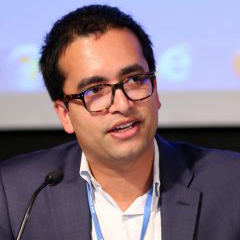A key topic at the 27th United Nations Conference of the Parties (COP27) climate summit is how to make sure the world's richest countries live up to their promises on climate change under the Paris Agreement adopted at COP21 in 2015.

"Given the big pledges made in the past, there is more of a focus on, what do they actually mean?" says Boston University's Rishikesh Ram Bhandary, speaking from the Red Sea resort town of Sharm el-Sheikh, Egypt, where COP27 will wrap up Friday after two weeks.
Policymakers, politicians, scientists, and activists gather annually at the COP summits to move forward against climate change. (No COP was held in 2020 because of the pandemic.) But many fear that change is not happening fast enough.
"We are on a highway to climate hell with our foot still on the accelerator," United Nations Secretary-General António Guterres told the summit last week.
Governments and large multinationals have promised in various ways to reach net-zero emissions of greenhouse gases and change to sustainable processes, but activists say much of this is just "greenwashing."
"The process has moved from the phase of major announcements without a lot of details to, are you holding yourself accountable to these commitments?" says Bhandary, assistant director of the Global Economic Governance Initiative at the BU Global Development Policy Center (GDP). "The mood is that we need to parse what are actual, solid commitments versus what is just sort of hot air."
The process has moved from the phase of major announcements without a lot of details to, are you holding yourself accountable to these commitments?
Another big topic at COP27 is the drive by the poorer nations bearing the brunt of climate change to exact compensation from the wealthier nations responsible for the majority of the greenhouse gases released into the atmosphere to date. This so-called "loss and damage" compensation was not originally on the COP27 agenda until developing countries pushed for its inclusion. Getting it on the agenda required concessions, though, including putting off a decision until 2024.
"It was sort of a bittersweet victory after a very hard-fought battle to get this on," Bhandary says. "You have a country like Pakistan that has been devastated by flooding, and it's very real to people there, and there's a lot of pressure to get something done here. And to keep punting this to 2024 is, well… But the negotiations have begun."
The Global Development Policy Center is a research center working to advance financial stability, human well-being, and environmental sustainability across the globe. Bhandary is an expert on climate finance and international climate negotiations; he was also a contributing author and chapter scientist in the Intergovernmental Panel on Climate Change's Fifth Assessment Report.
Bhandary appeared on a COP27 panel last week discussing the center's research into the international debt of some of the most climate-vulnerable nations, whose response to the problem is hamstrung by their need to satisfy debt obligations.

"The idea was to really think about who holds the debt of these countries, and if there was to be a debt relief effort, who would have to be involved, and how that profile has changed over time," he says. "The top-line finding is that private creditors are a very big faction, so any international effort to address the debt burden of those countries really needs to engage with private creditors." Under some proposals, countries could reduce debt by promising to spend money on climate change.
Bhandary has also been involved in other events at COP27, from Twitter spaces to roundtables, as have other BU specialists: Pamela Templer, a BU College of Arts & Sciences professor and chair of biology; Lara Merling, a GDP senior policy advisor; and Irena Vodenska, a Metropolitan College professor of finance and director of finance programs.
There has been some buzz among activists that the COP process itself has been corrupted by the involvement of leading economies and multinational corporations-as seen in the crowd of greenhouse-gas-emitting private jets Bhandary says can be heard overhead on the summit's busy days. But this is "a double-edged sword," he says, because in the beginning, the main goal was simply to get those powers to pay attention to the problem and join the process.
With Jennifer Allan, a Cardiff University senior lecturer in international relations, Bhandary recently published a paper on how COP's multilateral process works. "What happens here and how countries negotiate in this process is crucial for my research-just being here, talking to people, seeing what happens. It directly informs my research," he says.
His work focuses on what gets discussed and what doesn't, so the loss and damage debate was particularly interesting for "the coalition-building that needs to happen for something like that to get on the agenda-and once it gets on the agenda, it gathers momentum."
Some twists and turns in the process may fuel pessimism, he says, but there are others that suggest a growing recognition of the urgency of acting.
"I was at a panel this morning where the finance minister of Ghana said there has to be a Marshall Plan moment," Bhandary says, and other leaders have been calling for something similar. "They're saying now is the time to act, now is the time when we need a very strong, ambitious, and bold response. Those are things you are hearing from a bunch of quarters. We'll see how that amplifies and echoes as we go ahead."






